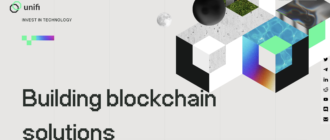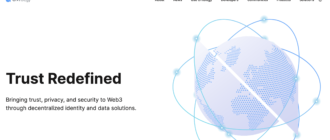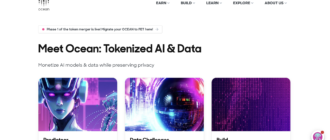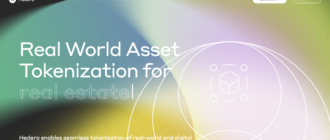This article provides an in-depth analysis of the Akropolis project and its native cryptocurrency, AKRO. We will explore the origins and evolution of Akropolis, dissect its technological framework, examine its tokenomics, and delve into the project’s broader ecosystem. Furthermore, we will evaluate the growth potential and future outlook of Akropolis, considering both its current achievements and future roadmap.
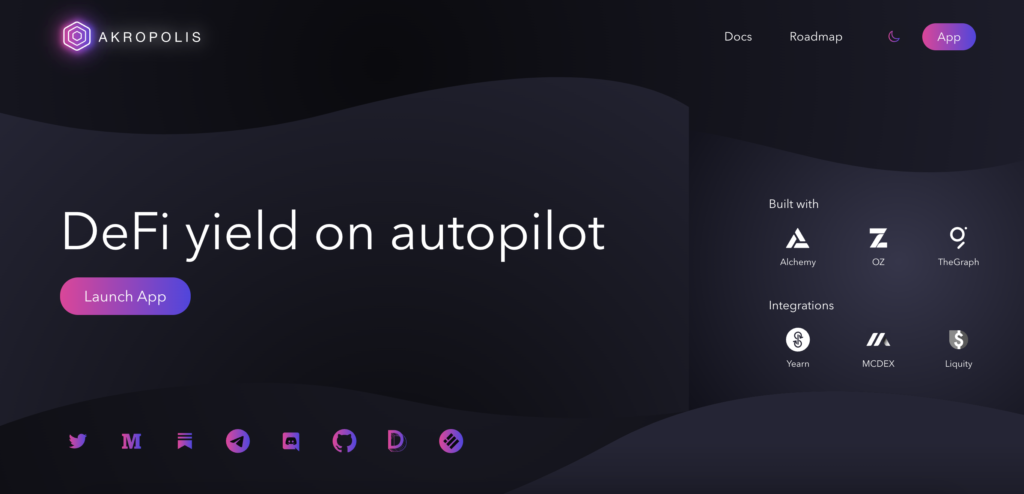
What is Akropolis?
Akropolis is a decentralized finance (DeFi) platform designed to provide a range of financial services without the need for traditional banking intermediaries. Built on the Ethereum blockchain, Akropolis aims to democratize access to financial tools and services, such as savings, lending, and yield farming. The platform leverages a suite of decentralized applications (dApps) and smart contracts to create Autonomous Finance Organizations (AFOs), which operate independently and provide financial services to users globally. By eliminating the need for central authorities, Akropolis offers a more secure, transparent, and inclusive financial ecosystem.
History of the Project
Founded in 2017, Akropolis has steadily evolved to become a notable player in the DeFi space. The project launched its initial coin offering (ICO) in 2019, raising approximately $2.4 million in ETH. This capital infusion enabled Akropolis to develop and deploy its core technology, including the AkropolisOS framework, which serves as the backbone for its decentralized applications. Key milestones in Akropolis’s development include:
- 2017: Project inception and initial development phase.
- 2019: Successful ICO and subsequent listing of the AKRO token on major exchanges.
- 2019: Launch of the AkropolisOS framework, providing a development toolkit for creating DeFi dApps.
- 2020: Introduction of Sparta and Delphi, two flagship dApps focused on undercollateralized lending and yield farming, respectively.
- 2021: Integration with prominent DeFi protocols such as Compound, Maker, and Yearn Finance, enhancing the platform’s functionality and user base.
- 2022: Expansion into the Polkadot ecosystem, enabling cross-chain functionality and increased scalability.
Throughout its history, Akropolis has consistently focused on enhancing its technological capabilities and expanding its ecosystem, positioning itself as a versatile and resilient DeFi platform.
How Akropolis Works
Akropolis operates on the Ethereum blockchain and utilizes a range of advanced technologies to provide decentralized financial services. The core technology stack of Akropolis includes smart contracts, decentralized applications (dApps), and a software development kit (SDK) known as AkropolisOS. These technologies collectively enable the creation, management, and operation of Autonomous Finance Organizations (AFOs), which are decentralized entities that deliver financial services without the need for traditional intermediaries.
Core Technologies
- Smart Contracts: Smart contracts are self-executing contracts with the terms directly written into code. On Akropolis, smart contracts handle the automation of financial transactions, including lending, borrowing, and yield farming. These contracts ensure transparency, security, and efficiency by eliminating the need for third-party intervention.
- AkropolisOS: AkropolisOS is an SDK designed to facilitate the development of DeFi dApps. It includes pre-built smart contract modules that developers can use to create customized financial applications. The SDK also supports integration with other DeFi protocols, such as Compound, Maker, and Yearn Finance, enhancing the versatility of the Akropolis ecosystem.
- AFOs: Autonomous Finance Organizations form the backbone of Akropolis, enabling decentralized financial operations. These organizations operate independently, managing member contributions, loans, and savings. By leveraging AFOs, Akropolis provides a decentralized alternative to traditional financial institutions, promoting financial inclusion and autonomy.
Blockchain and Consensus Mechanism
Akropolis operates on the Ethereum blockchain, leveraging its robust and secure infrastructure. Ethereum provides a decentralized platform for executing smart contracts and dApps, ensuring the immutability and security of financial transactions within the Akropolis ecosystem.
Consensus Mechanism
The consensus mechanism employed by Akropolis is Proof of Stake (PoS). In PoS, validators are chosen based on the number of tokens they hold and are willing to “stake” as collateral. Validators are responsible for validating transactions and securing the network. The key details of Akropolis’s consensus mechanism include:
- Validator Nodes: There are a maximum of 30 validator nodes on the Akropolis network. Validators are chosen through a staking process, where users need to stake a minimum of 1 million AKRO tokens to participate. Validators earn rewards in the form of transaction fees and newly minted AKRO tokens.
- Staking and Governance: AKRO token holders can participate in staking to support network security and governance. By staking their tokens, users help validate transactions and maintain the network’s integrity. Additionally, stakers can vote on governance proposals, influencing the development and direction of the platform.
- Security Audits: To ensure the security and reliability of its smart contracts and overall infrastructure, Akropolis employs third-party security audits. Notably, the platform has partnered with CertiK, a leading blockchain security firm, to conduct comprehensive security assessments.
Unique Features
Akropolis distinguishes itself from other DeFi platforms through several unique features:
- Integration with Polkadot: Akropolis has integrated with the Polkadot ecosystem, enhancing its interoperability and scalability. This integration allows Akropolis to operate as a parachain on Polkadot, benefiting from its security and cross-chain functionality.
- Under-collateralized Loans: Through its dApp Sparta, Akropolis offers under-collateralized loans, requiring only 50% collateral. This feature provides users with greater borrowing flexibility compared to traditional DeFi platforms that typically require over-collateralization.
- Yield Optimization: Akropolis’s Delphi dApp facilitates automated yield farming, optimizing users’ returns across various DeFi protocols. This feature simplifies the process of yield generation, making it accessible to users without extensive DeFi knowledge.
In summary, Akropolis leverages a sophisticated combination of smart contracts, AFOs, and a robust SDK to deliver a comprehensive suite of decentralized financial services. Its integration with leading DeFi protocols and the Polkadot ecosystem further enhances its functionality and appeal within the DeFi landscape.
Tokenomics of Akropolis
The native asset of the Akropolis platform is the AKRO token. It is important to clarify that AKRO is a token, not a coin. The distinction lies in the fact that AKRO operates on the Ethereum blockchain as an ERC-20 token, meaning it relies on Ethereum’s infrastructure for its operations rather than having its own independent blockchain.
Token Emission Model
The total supply of AKRO tokens is capped at 5 billion, ensuring a fixed supply to prevent inflationary pressures. Out of this total, approximately 4.3 billion tokens are currently in circulation, representing around 86% of the total supply. The distribution of these tokens was strategically planned during the initial coin offering (ICO) and subsequent allocations:
- 8% was allocated to the Huobi Prime Offering.
- 9.5% was reserved for the team and advisors.
- 46% was set aside for the foundation reserve.
- 22.5% was allocated for the token sale.
- 14% was designated for marketing and community incentives.
Utility and Functionality
AKRO serves multiple roles within the Akropolis ecosystem:
- Governance: AKRO token holders can participate in the governance of the platform. This includes voting on proposals, protocol updates, and other significant decisions that influence the direction of the project.
- Staking: Users can stake AKRO tokens to earn rewards. Staking supports the network’s security and operational efficiency. Validators, who secure the network by validating transactions, are rewarded with transaction fees and newly minted AKRO tokens.
- Incentives: AKRO tokens are used to incentivize various activities within the ecosystem, such as providing liquidity, participating in yield farming, and engaging in bug bounties.
Price Dynamics
The price of AKRO has been subject to the volatility characteristic of the broader cryptocurrency market. Various factors influence its market price, including:
- Market Sentiment: Positive news, partnerships, and developments can lead to price appreciation, while negative events can result in price declines.
- Adoption and Usage: The increasing adoption of the Akropolis platform and the growing use of AKRO tokens for governance, staking, and incentives contribute to its demand and value.
- Supply and Distribution: The fixed supply cap and the distribution of tokens among investors, team members, and reserves play a role in its market dynamics.
Unique Aspects
Several unique aspects differentiate AKRO from other DeFi tokens:
- Integration with Polkadot: Plans to integrate AKRO with the Polkadot ecosystem aim to enhance interoperability and scalability. This strategic move positions AKRO for broader adoption and utility across different blockchain networks.
- Autonomous Finance Organizations (AFOs): The use of AFOs allows decentralized and autonomous management of financial services, making Akropolis distinct in its approach to DeFi.
- Yield Optimization: Through tools like Delphi, Akropolis enables users to optimize their yield farming strategies across various DeFi platforms, thereby maximizing returns on their investments.
In summary, AKRO is a multifaceted token integral to the operation, governance, and incentive structures of the Akropolis platform. Its tokenomics are designed to promote stability, encourage active participation, and support the long-term sustainability of the ecosystem.
Where to Buy AKRO Cryptocurrency
The AKRO token is widely available on several major cryptocurrency exchanges, making it accessible to a broad range of investors. Here are some of the primary exchanges where you can purchase AKRO:
- Binance: One of the largest and most popular cryptocurrency exchanges globally, Binance offers AKRO trading pairs with various cryptocurrencies, including BTC, ETH, and USDT.
- HTX (formerly Huobi): HTX provides a robust platform for trading AKRO with high liquidity and a variety of trading pairs.
- MEXC: Known for listing a wide range of digital assets, MEXC supports AKRO trading with multiple pairs and offers advanced trading features.
- BingX: A leading derivatives exchange, BingX also offers spot trading for AKRO, providing users with a secure platform to trade the token.
- KuCoin: KuCoin supports AKRO trading and offers various tools and features, such as trading bots and lending services, to enhance the trading experience.
Where to Store AKRO Tokens
Storing your AKRO tokens securely is crucial to protect your investment. Here are some recommended wallets that support AKRO:
- MetaMask: A popular Ethereum-based wallet, MetaMask allows users to store, send, and receive AKRO tokens. It also supports integration with various decentralized applications (dApps) on the Ethereum network.
- Ledger Nano S/X: These hardware wallets offer high security for storing AKRO tokens offline. They provide protection against online threats and are ideal for long-term storage.
- Trust Wallet: An easy-to-use mobile wallet that supports a wide range of cryptocurrencies, including AKRO. Trust Wallet is known for its user-friendly interface and strong security features.
- MyEtherWallet (MEW): A well-known Ethereum wallet that supports all ERC-20 tokens, including AKRO. MEW allows users to manage their tokens via a web interface and hardware wallet integration.
- Coinbase Wallet: Separate from the Coinbase exchange, the Coinbase Wallet is a mobile wallet that supports AKRO and other ERC-20 tokens. It offers a simple interface and strong security measures.
Storing Options and Features
- Security: Hardware wallets like Ledger Nano S/X provide the highest level of security by keeping your private keys offline.
- Accessibility: Mobile wallets like Trust Wallet and Coinbase Wallet offer convenient access to your tokens and can be easily managed on the go.
- Integration: Wallets like MetaMask and MyEtherWallet allow seamless interaction with decentralized applications, enabling you to participate in DeFi activities directly from your wallet.
By choosing a reputable exchange for purchasing AKRO and a secure wallet for storage, you can manage your AKRO tokens effectively and safely.
Project Growth Prospects
Akropolis is well-positioned for significant growth due to several foundational factors. The project leverages the burgeoning interest in decentralized finance (DeFi), providing unique financial tools that cater to both individual and institutional users. The growth of Akropolis is underpinned by its innovative approach to financial autonomy through Autonomous Finance Organizations (AFOs), which facilitate decentralized financial services without intermediaries.
Key Growth Factors
- Technological Innovation: Akropolis continuously develops its technological infrastructure, including its AkropolisOS SDK, which simplifies the creation of DeFi applications. This ongoing innovation attracts developers and users looking for efficient and secure financial solutions.
- Market Demand for DeFi: The increasing adoption of DeFi platforms highlights a growing market demand for decentralized financial services. Akropolis’s unique offerings, such as under-collateralized loans and automated yield farming, position it to capture a significant share of this market.
- Strategic Partnerships: Akropolis has formed partnerships with prominent blockchain projects and DeFi protocols, enhancing its ecosystem and increasing its reach. Key partners include:
- Polkadot: Integration with Polkadot for cross-chain functionality.
- Compound: Integration for lending and borrowing services.
- Maker: Collaboration for stablecoin-based lending.
- Yearn Finance: Yield optimization and automated strategies.
Client Base
Akropolis serves a diverse client base, including individual investors, institutional players, and decentralized autonomous organizations (DAOs). The platform’s tools and services cater to various financial needs, from savings and lending to yield farming and governance participation.
Development and Adoption Forecast
The future development of Akropolis is focused on expanding its ecosystem and enhancing its technological capabilities. The integration with the Polkadot ecosystem and ongoing improvements to the AkropolisOS framework are expected to drive further adoption. As DeFi continues to gain mainstream acceptance, Akropolis is well-positioned to benefit from this trend.
Ecosystem
The Akropolis ecosystem comprises various decentralized applications and tools designed to provide comprehensive financial services. Key components of the ecosystem include:
- AkropolisOS: A development framework that supports the creation of DeFi applications, enabling seamless integration with other protocols.
- Sparta: A dApp offering under-collateralized loans, allowing users to borrow with only 50% collateral, thus enhancing liquidity and borrowing flexibility.
- Delphi: A yield farming and investment platform that automates passive income generation through curated DeFi opportunities.
- Yearn Vaults: Integration with Yearn Finance to offer optimized yield strategies for users’ assets.
- Vortex: An upcoming feature designed to provide market-neutral liquidity provision with high capital efficiency.
Ecosystem Partners
In addition to the core components, the Akropolis ecosystem includes partnerships with several leading DeFi projects and protocols, which enhance its functionality and user experience. These partners include:
- Polkadot: Providing cross-chain interoperability and scalability.
- Compound: Enabling decentralized lending and borrowing.
- MakerDAO: Facilitating stablecoin-based lending services.
- Chainlink: Offering secure and reliable oracle services for smart contracts.
By leveraging these partnerships and continuously innovating, Akropolis aims to create a robust and versatile financial ecosystem that meets the evolving needs of the DeFi market.
Conclusion
In conclusion, Akropolis represents a significant innovation within the decentralized finance (DeFi) sector, offering unique solutions for asset management and financial independence. By leveraging a robust technological framework and fostering a community-driven ecosystem, Akropolis positions itself as a pivotal player in the future of decentralized finance. The project’s continued development and strategic partnerships will be crucial in determining its long-term success and impact on the DeFi landscape.

